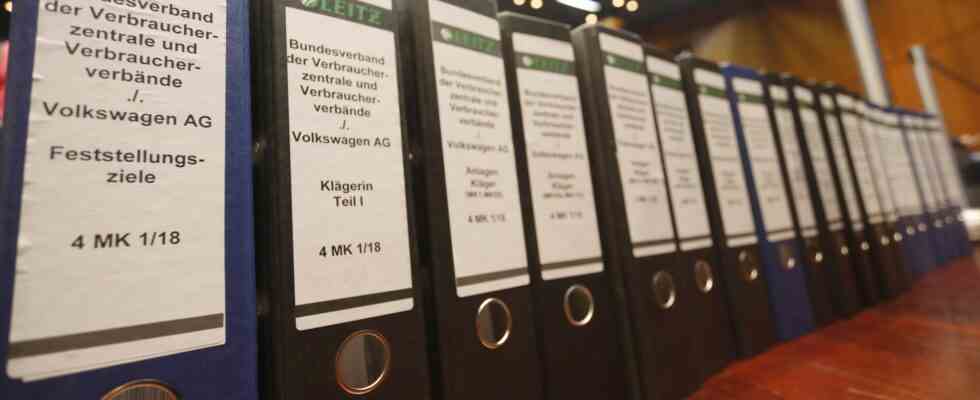Status: 08/05/2022 04:57 am
Are legal service providers allowed to jointly sue for possible claims from thousands of consumers? VW fought back in the diesel scandal – but without success. Mass procedures will therefore remain.
Suing banks, airlines or car manufacturers for damages can be time-consuming and involve a cost risk. If you don’t have legal protection insurance, you might prefer not to. Legal service providers have recognized a business model in this: They have possible claims from consumers assigned to them and then sue the claims in a bundle – for a success fee, but without any cost risk for the consumer. Companies have repeatedly argued against the permissibility of this business model in court. The Federal Court of Justice has now comprehensively declared such class action lawsuits to be admissible, also with regard to a mass bundling of claims. This emerges from the reasons for the judgment, which ARD legal department present. The decision had already been announced in mid-June – but the detailed reasoning followed only now.
VW believes class action lawsuits are unlawful
The case concerned claims for damages from Swiss Volkswagen customers due to the emissions scandal. They had assigned their claims to Myright, which is running the “class action” business model in connection with the diesel scandal on a large scale. In total, tens of thousands of possible claims against Volkswagen (VW) assigned to Myright are pending in the German courts – bundled in several class action lawsuits. Most come from German consumers.
VW was of the opinion that this business model violated German law – namely the Legal Services Act. This regulates out-of-court legal services. It serves the purpose of protecting legal seekers, legal transactions and the legal system from “unqualified legal services”. It is regulated, for example, what requires a special registration and when legal services may not be provided.
BGH: Business model “undoubtedly” allowed
However, the Federal Court of Justice did not find that Myright’s business model violated this law. “Mass claims for damages” against VW because of the emissions scandal can be assigned and then asserted in a class action lawsuit is “undoubtedly” permitted under German law.
In particular, the admissibility of a class action suit does not depend on the number of claims assigned. At the oral hearing in mid-June, VW argued that in some cases several thousand claims were bundled in the diesel class action lawsuits. Unlike the collective enforcement of passenger rights, which the Federal Court of Justice had already declared admissible. There it was only about seven identical claims. “The Senate didn’t have a case like Myright in mind,” said the automaker’s attorney.
From the point of view of the Federal Court of Justice, “no undue pressure” is exerted on VW by bundling the claims. It is also irrelevant that Myright wants to make money with the class action lawsuits: “Making money with a lawsuit is not reprehensible per se.”
BGH: Bundling improves negotiating position “significantly”
The Karlsruhe judges also point out that those affected were able to “considerably” improve their negotiating position vis-à-vis the group by commissioning Myright. An economic balance was only achieved by bundling the claims – also with regard to resources for legal and expert advice.
This applies in particular against the background that at the time when a statute of limitations for the claims was in the room, the Federal Court of Justice had not yet made a fundamental decision – the question of whether those affected had a claim for damages at all, i.e. it was still open when customers asked themselves had to decide for or against a lawsuit.
Restriction on external financiers
Karlsruhe makes one restriction with regard to support from external litigation financiers. They must not have the opportunity to influence the enforcement of the claims or a possible settlement. However, as long as they do not have “substantial decision-making powers”, the Federal Court of Justice sees no conflict of interests. What is decisive is how the contractual relationship between the legal service provider and the litigation financier is designed in the individual case. The Federal Court of Justice had already accepted similar models for enforcing tenant and passenger rights.
Nevertheless, Volkswagen sticks to its view and refers to the decisions of lower instances. According to this, Myright’s business model is geared towards asserting unfounded claims to increase bargaining power. Such a business model is not worthy of protection.
Class actions also for passengers, renters and bank customers
The business model is not only important in the context of the emissions scandal. Claims from passengers, renters and bank customers are also enforced in this way by other providers. The first mass proceedings are already reaching the courts in connection with losses from games of chance in online casinos.
It is now up to the courts of lower instances to find a way to practically deal with such class action lawsuits, which bundle possible consumer claims en masse.

